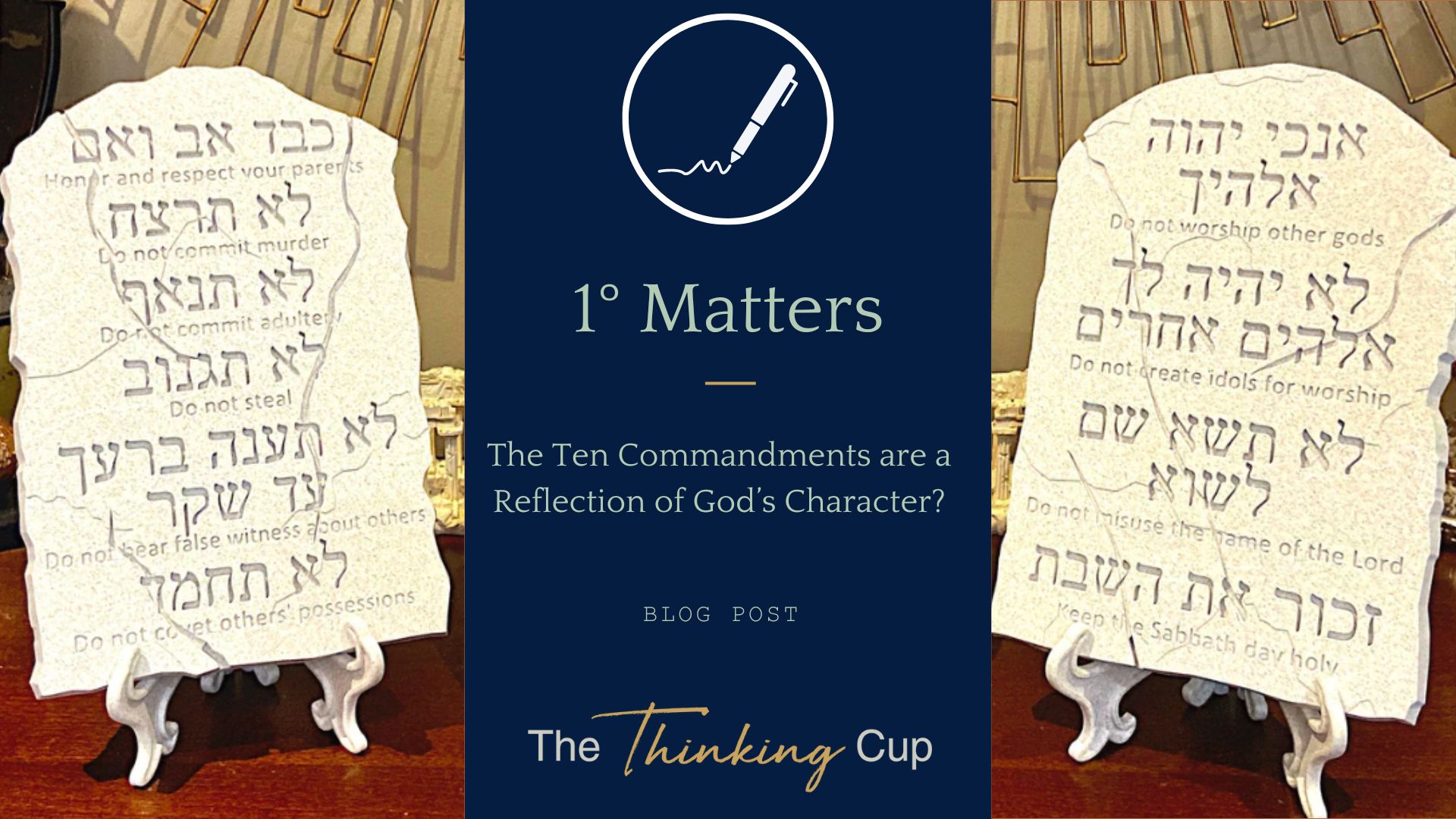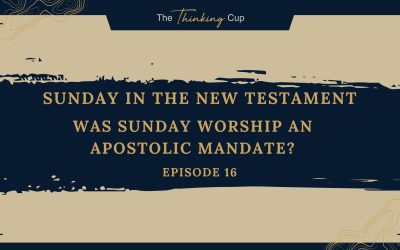Words matter when it comes to theological statements!
The Seventh-day Adventist Fundamental Beliefs book, Seventh-day Adventists Believe: An Exposition of the Fundamental Beliefs of the Seventh-day Adventist Church, makes a de facto claim:
“As a reflection of God’s character, the ten-commandment law is moral, spiritual, and comprehensive, containing universal principles.” [1]
As an Adventist, I never learned to ask good questions about statements others claimed to be fact. But now that I am no longer a Seventh-day Adventist, I’ll ask the question of my Adventist friends:
-
- Where in Scripture does the Ten Commandments claim to reflect God’s character?
- If the Ten Commandments share communicable attributes of God, does this mean these attributes reflect God’s character?
- If God is never changing, and the Ten Commandments ‘are’ a reflection of God’s character, then why did the Ten Commandments change? (Exodus vs. Duet.)
As I read through the Fundamental Beliefs book again after studying it several times, I am reminded of how many assertions are made without any biblical backing.
Many have asked why I left the Adventist church. The simple answer is that we studied our way out of it. Many of the 28 Fundamental Beliefs I do not feel align with the Bible. The Adventist view and doctrinal statement on the ‘Law of God’ is one of them.
I understand that the Adventist belief system needs the Ten Commandments renewed under the New Covenant, but this distorts the New Covenant. Adventism needs the Ten Commandments because the Sabbath is the ‘halo’ law that gets wrongly connected to the seal of God in Revelation. Ellen White was clear on this topic:
“I saw the ten commandments written on them [the tables of stone] with the finger of God. On one table were four, and on the other six. The four on the first table shone brighter than the other six. But the fourth, the Sabbath commandment, shone above them all; for the Sabbath was set apart to be kept in honor of God’s holy name. The holy Sabbath looked glorious—a halo of glory was all around it. I saw that the Sabbath commandment was not nailed to the cross. If it was, the other nine commandments were; and we are at liberty to break them all, as well as to break the fourth.…” [2]
Again, we are up against a statement from Ellen White that speaks a concept into existence, and because the church sees her writings as correcting faulty interpretations made from man and traditions, what she says stands. The Sabbath is of the utmost importance to an Adventist, not because it’s biblical but because Ellen White claims it. But I’m digressing. Let’s get back to the covenant.
This New Covenant, ratified with the blood of Jesus Christ, was not just a renewal of the Old Covenant. (I’ll cover the reason why I take this stance later in the article) A New Law must legally be put in place with a New Covenant.
Question: Was there EVER a time in the Old Testament when Gentiles were required to keep the Law to worship YHWH?
Read the story of Naaman in 2 Kings 5:1-17.
Most people know the story well, but very few read the details of what happened after Naaman was healed from leprosy after washing seven times in the river. For clarity, Naaman was a Syrian army General. He was a Pagan in a country that honored and worshiped other Gods, not YHWH.
In verse 15, we see Naaman trying his best to give the prophet of God a gift of gratitude. Of course, this is turned down, and out of deep appreciation for everything that YHWH had done for him, Naaman begged the prophet to let him take two mule loads of earth back with him to Syria.
“Then he returned to the man of God and all his company, and he came and stood before him. And he said, “Behold, I know that there is no God in all the earth but in Israel; so accept now a present from your servant.” But he said, “As the Lord lives, before whom I stand, I will receive none.” And he urged him to take it, but he refused. Then Naaman said, “If not, please let there be given to your servant two mule loads of earth, for from now on your servant will not offer burnt offering or sacrifice to any god but the Lord. In this matter may the Lord pardon your servant: when my master goes into the house of Rimmon to worship there, leaning on my arm, and I bow myself in the house of Rimmon, when I bow myself in the house of Rimmon, the Lord pardon your servant in this matter.” He said to him, “Go in peace.” (2 Ki 5:15–19)
Notice that Naaman was still in the temple service of the god Rimmon. Naaman knew that when he returned to his hometown, he would be required to help his master worship another god. But Naaman desired dirt from the territory that YHWH owned so that he could still worship YHWH, even though he was in the service of another god. Naaman acknowledged and pledged his ultimate authority to YHWH.
Dr. Michael Heiser captures this theological statement inside this story well:
“We aren’t told if Naaman went home and spread dirt on the floor of a room in his home. We don’t know how he handled his duty to accompany his aged king into Rimmon’s temple. Perhaps he carried dirt with him as a pledge of his believing loyalty to Yahweh. What we do know is that the dirt was a theological statement. Dirt from Israel was the means by which Naaman showed his faith and kept his vow to the true God, Yahweh.” [3]
The theological statement would have been clear for a Hebrew reading the text. This wasn’t about Naaman needing to pledge his loyalty as a pagan to YHWH through embracing the Torah or the Ten Commandments. He was pledging his believing loyalty through his worship, not the keeping of the Law.
I bring this example up to show the complete blindness the Adventist system has to examples in Scripture of Gentiles honoring God. Still, because they were NOT under the same covenantal relationship with YHWH, they were not required to abide by the same laws.
Many reading this blog are not Jewish, Hebrew, Israelite, or even Judaic. We are not under the same covenantal system from an ethnic standpoint, even though Jesus fulfilled ALL of the covenant in the Old Testament and now has inaugurated a New Covenant that was foretold about in Jeremiah:
“Behold, the days are coming, declares the Lord, when I will make a new covenant with the house of Israel and the house of Judah, not like the covenant that I made with their fathers on the day when I took them by the hand to bring them out of the land of Egypt, my covenant that they broke, though I was their husband, declares the Lord. For this is the covenant that I will make with the house of Israel after those days, declares the Lord: I will put my law within them, and I will write it on their hearts. And I will be their God, and they shall be my people. And no longer shall each one teach his neighbor and each his brother, saying, ‘Know the Lord,’ for they shall all know me, from the least of them to the greatest, declares the Lord. For I will forgive their iniquity, and I will remember their sin no more.” Thus says the Lord, who gives the sun for light by day and the fixed order of the moon and the stars for light by night, who stirs up the sea so that its waves roar— the Lord of hosts is his name: (Je 31:31–35)
This is the exact context that the author of Hebrews is discussing in Hebrews 8:13, in which the author explains that the truth of Hebrews 7:11-12, 18 was already anticipated by the prophets. In verses 8-12, he actually quotes the New Covenant of Jeremiah 31:31-34 and then Hebrews 8:13:
“In speaking of a new covenant, he makes the first one obsolete. And what is becoming obsolete and growing old is ready to vanish away.” (Heb 8:13)
Thus, the Law of Moses became old with Jeremiah and vanished away with the Messiah’s death. Remember, the law only makes sense in the context of a covenantal arrangement. How could something that is vanishing away be a reflection of God’s character? If you argue that only the covenant vanished and not the law, then you must argue that the same New Covenant was only a renewal of the Old Covenant. In other words, you are claiming that Jesus came to give himself as a ransom so that he could reinstate the same law and covenant that didn’t work before. Sigh, this would be deplorable logic and exegesis of the text!
There are several reasons why I would argue that the New Covenant described in the New Testament is distinct from the Old Covenant, rather than just a renewal:
-
- Nature of the Covenants: The Old Covenant, made through Moses, was based on the Law (Torah) and its rituals, sacrifices, and commandments. The New Covenant, introduced through Jesus, is said to be based on grace and faith rather than strict adherence to the Law. This marks a fundamental shift in the way people relate to God.
- Jeremiah’s Prophecy: In Jeremiah 31:31-34, the prophet speaks of a “new covenant” that will not be like the old one, where God will write His law on people’s hearts. This indicates a future covenant different in nature and scope, which many interpret as fulfilled in the New Testament.
- Jesus’ Sacrifice: The New Covenant is centered around Jesus’ sacrificial death and resurrection, which provides a once-and-for-all atonement for sins, contrasting with the repetitive animal sacrifices of the Old Covenant. Hebrews 8:6-13 emphasizes that the New Covenant is “better” and makes the old one obsolete.
- Inclusion of Gentiles: The New Covenant allows Gentiles (non-Jews) to enter into a relationship with God without having to follow the Mosaic Law. This expansion of God’s covenant to include all nations is seen as a significant departure from the more exclusive Old Covenant focused on Israel.
These distinctions are why scholars typically view the New Covenant as something fundamentally new rather than merely a renewal of the Old Covenant.
So, I will ask again:
-
- Where in Scripture does the Ten Commandments claim to reflect God’s character?
- If the Ten Commandments share communicable attributes of God, does this mean these attributes reflect God’s character?
- If God is never changing, and the Ten Commandments ‘are’ a reflection of God’s character, then why did the Ten Commandments change? (Exodus vs. Duet.)
This is just another example of small statements inside the Adventist Theological framework that don’t seem to be out of step with Scripture but, when analyzed, don’t line up. Some might think I’m splitting hairs on a topic like this. Or the famous, “Mike, you are making a big deal out of nothing. Just love Jesus and stop all this nonsense.”
1° Matters
Well, the best way to explain the issue is with an analogy. If you are given the coordinates to a location and told that you are to travel 777 miles at 140 degrees due South East, but instead of following direction, you decide to travel at 141 degrees due South East. I mean, it really isn’t a big deal, right? It isn’t that much of a difference?
I used to be a mathematician, and I wish I could say that I did the math for this analogy, but ChatGPT is pretty cool. Well, for all of my Mathematical nerds out there, I’ll go ahead and share the process for finding the answer:
To find the distance between two travelers who traveled 777 miles but in slightly different directions (140° and 141°), we can use spherical geometry, specifically the law of cosines for the sides of a spherical triangle.
Since the angle difference is just 1°, the distance between the two endpoints is relatively small compared to the distances traveled. Here’s how you can calculate it:
- Law of Cosines for Spherical Triangles: The formula to calculate the angular distance d between two points on a sphere is:
d =R × arccos(cos(C))
Where:
R is the radius of the Earth (approximately 3,959 miles),
C is the angular difference in directions (which is 1 degree in this case).
The formula simplifies further because you are only dealing with a 1° difference at nearly the same distance.
- Plugging the value in: d = 3959 x arccos(cos(1°)
The result will give you the distance between the two travelers. Let me calculate that for you.
After traveling 777 miles at 140° and 141° due southeast, respectively, the two travelers would be approximately 69.1 miles apart.
So, does it really matter if you are off just a little bit with your directions? Yes!
Does it matter if your theology is off just a little bit? ABSOLUTELY!
It is poor exegesis and theologically misleading for the Seventh-day Adventist Church to claim that the Ten Commandments reflect God’s character!
This analogy goes both ways. Don’t just take my words as truth; test them against Scripture and make sure they match up!
If you want an additional article on this topic, you can check out this post here: Is the Law the Transcript of God’s Character?
In Christian Love,

[1] Seventh-Day Adventists Believe, 358
[2] Ellen Gould White, Maranatha, The Lord Is Coming (Review and Herald Publishing Association, 1976), 245.
[3] Michael S. Heiser, The Unseen Realm: Recovering the Supernatural Worldview of the Bible, First Edition (Bellingham, WA: Lexham Press, 2015), 118.




0 Comments